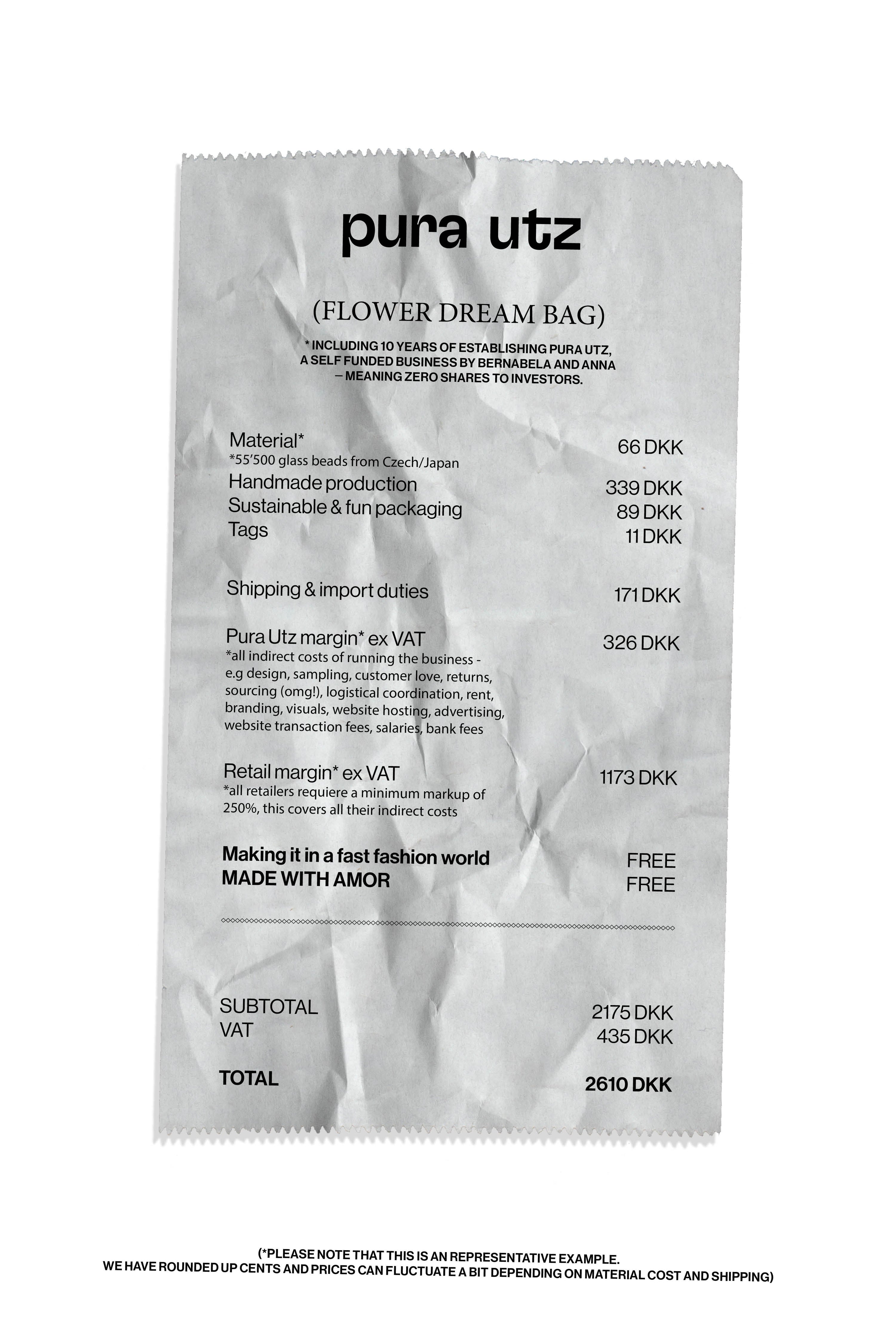
What’s Behind The Shiny Surface
So let’s get in to this a bit more. Maybe you just entered via the link from our Transparency page and had some questions or concerns about what you saw in the receipt we made?
MARGINS IN THE VALUE/SUPPLY CHAIN
As you can see from our receipt a laaaarge portion of a product price is reserved for our retailers. *The Retailer Margin as it is stated refers to the amount that the store tops off our product cost price by. The general *Minimum Margin for the fashion industry is 250%. And let me tell you, this is the MINIMUM.
The majority of retailers require much more and thus we have been turned down by many stores because they simply won’t make enough money in their excel spreadsheet. The majority of the products you buy and enjoy – especially fast fashion and high street have margins up to 1000% on the product you buy. With that knowledge it is more important than ever to start realizing that the true cost of a 15$ t-shirts is based on a value chain where the brand has up to 1200% margins on it. You do the math and figure out how much the women who made the t-shirt is then paid (and this is without taxes, shipping, packaging etc).
In order to be able to pay the women a super good wage and still create a product that we can move and sell to stores (to actually create an income that will have a social impact), Bernabela and I put the bare minimum margin for ourselves on the products. Because if we were suppose to also add on a normal margin of 150-250%, our products would simply turn out SUPER EXPENSIVE.
There fore we often put a very little margin to the products so that we can actually sell to retailers and expand our brand and impact. What we then live off of is our webshop – because when you shop here, the entire margin goes to Pura Utz and all our dreams *and aaall the indirect and direct costs of our business.
IT’S A CAPITALISTIC MARKET
The big revelation is that THIS IS A CAPITALISTIC MARKET. And the capitalistic market serves the end of the value chain where profit has been maximized for the purpose of great profits to the big boss. Production, people and materials is completely exhausted to be able to allow larger profits and volumes to the purchasing end of the value chain. And this is actually just pretty f**** up.
Maybe this whole transparent aspect is new and mind blowing to you – it sure was to us. Bernabela and I have had to make big decisions on whether or not to take out margins to be able to sell to a certain store, just to get our project and brand out there.
Even though we try to defy the uneven power in the capitalistic system of producers and purchaser, we are still part-taking in this very system. We are a brand that is based in Denmark and Guatemala. The classic capitalistic divide between a purchasing country and a producing country. Our products are waaaay overpriced to be able to sell locally in Guatemala, meaning that the very people who produce them aren’t able to buy them.
That’s a catch-22. And this is probably true to all products we consume unless we buy from a small local artist or producer.
NEOcolonialism
To me personally learning this (I came from a nursing background and now studied Anthropology) was disillusioning. I realised that we might not be colonising in the historic sense of ‘colonisation’ but we are in terms of production. It’s called Neocolonialism.
‘We’ just moved back to our origin country but keep our production in the developing world – this also means that there is a need to keep these countries poor and depending on us, otherwise the capitalistic value chain can’t sustain itself.
So are we doing it any differently at Pura Utz? At first it seemed like a super great idea to be able to open markets and creating a business that is FOR our team – both financially and emotionally. We are a team and everything is transparent between us. But at the same time this is a model that reproduces the old system of oppression through maintaining the narrative of our team being the producers and not the purchasers. You see what I mean?
The main difference is that Bernabela is legally 50% owner of this business based in both worlds. She actually soon will have a legal document in her hand making her an official business owner in Denmark. Other than that – we are not in business to have the women in our team sit and do beadwork for the rest of their lives. We see it as a stepping stone to financial freedom to pursue new dreams and goals. That is also why we want to create our own beautiful production place in Guatemala so that within our organisation we can offer different vessels of work, which gives our team opportunities to take on other work areas and eventually go do their own thing if that is what they wish to.
What we ask ourselves: is it possible to have a fair business in a capitalistic market? Is it possible to create a business that actually serve the producing end of the value chain - or will this always reproduce the same system that we are trying to defy?
If at some point this doesn’t make sense to us anymore we will change our business. Because this is about our team of amazing women and what we are living and creating together.
Do you have any thoughts on this? We LOVE to learn more about this super complex business we have gotten ourselves in to.
Write us at loveletters@purautz.com ❤️